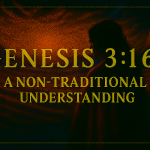When the Bible describes an authentic and undeniable hierarchy, a distinct verb is used.
God blessed them: God said to them, “Be fruitful, multiply, fill the earth and subdue it. Rule over the fish in the sea, the birds in the air and every living creature that crawls on the earth.” —Gen. 1:28 CJB
In the above verse, the Hebrew term for “rule” or “dominion” is radah, not mashal. Radah, in Genesis 1:28, conveys the sense of “to rule, to exercise dominion, or to bring under control,” signifying a genuine, God-given authority explicitly extended to both women and men.
Notably, the Septuagint also uses a different verb, αρχετε (“to be first”), in Genesis 1:28, rather than κυριεύσει, used in Genesis 3:16. An analysis of these words’ applications throughout Scripture, suggests that radah typically denotes a form of leadership characterized by order and a legitimate, structured transfer of authority.
On the other hand, mashal (used in Genesis 3:16) generally implies rule, but with a subtext of conquest or the forcible seizure of power, and the subjugation of individuals or entities against their will. It can also convey a general sense of having power, dominance, or influence, not necessarily involving a hierarchy.
Therefore, it seems these terms might refer to separate types of ruling, and it is possible that the “authority” depicted in Genesis 3:16, differs from the divine ‘radah’ of chapter one. It is likely not a God-given permission or right for the man to control his wife, which is the usual interpretation of a man ‘ruling.’
Since the first post in this study, I’ve become even more certain of this. However, there is still more to consider. In previous posts, I analyzed the first two parts of Genesis 3:16, and came away with the following possible translations:
And to the woman he said, “I will greatly multiply your grief and your sighing. Among sorrow you will bring forth descendants, and/but your turning (away) shall be toward your man…
And to the woman he said, “I will greatly multiply your toil and your child-birth. Among toil you will bring forth descendants and/but your turning (away) shall be toward your man…
Now, let’s look at the last part of the verse, traditionally rendered as, “and he will rule over you,” beginning with some common interpretations.
Common Interpretations
Many believers think this portion of the verse is either a commandment that the man should rule over his wife in a positive sense or a pronouncement that as a consequence of their sin, the man would now endeavor to rule over the woman in an ungodly abusive way.
Generally, those who take the first position, believe every man is called to be the ultimate authority in their household, the wife is to obey everything he says, and this “leadership” role somehow spills over into the church, making men authorities over all women.
Those who take the latter position, feel this was not a commandment from God, as this was never God’s will for a man to rule over his wife in such a way. However, due to the introduction of sin, men would now try to forcefully control women, some believing it to be the men’s response to the women’s desire to control them.
In other words, stubborn and controlling women would lead to men being even more stubborn and controlling, in order to maintain their position as head of household. So, basically, one wrong would cause the other.
There are two points I want to make before we move on. First, concerning the first view, per what is written in Scripture, it is a fact that God never issued any so-called marriage roles to men and women. Any idea that he did does not come from truth that is written, but from people’s own interpretations of what is written.
God does not explicitly or implicitly instruct any man to have “rule over” his wife or all women, nor does he command women to remain at home and submit to every desire of their husbands. Any verses that proponents of this belief use as potential support can be effectively challenged.
Nevertheless, if that’s what you and your spouse agree upon, then that’s your choice. There is nothing wrong with it as long as you don’t force your beliefs on others.
However, those who dogmatically claim that God has said something not clearly stated in Scripture, are attempting to add to his Word, and are likely misrepresenting his message. This, without question, is a dangerous thing.
Some may repeat these ideas out of ignorance, but those who knowingly spread such falsehoods are guilty of manipulation and deceit, trying to control others’ minds while masking their intentions under the guise of promoting a “unified” or “orderly” church; it is simply a form of deception.
The second point I want to make concerns the second view. Just as I stated in an earlier post in this study about women, the same is true for men. Men don’t generally seek to find a woman they can rule over abusively whether verbally or physically.
Even when dealing with difficult women, many men don’t resort to violence or abuse. In fact, though it remains a major problem, marriages with domestic violence, including physical and psychological abuse, are typically much less common than marriages without it.
It’s true that the opposite may be the case in many other countries and cultures where there is much evil, hate, and abuse towards women, especially towards women perceived as “rebellious.” However, the point is that this is not the case in all, or possibly even in the majority of situations.
So, where are we getting these false generalizations that all women are naturally rebellious while all men oppress women abusefully? Despite how it may be sugarcoated, this is exactly the message conveyed by those who promote these ideas; but they are simply not true.
So, why are we applying them to Scripture? Why is this verse among those used to support the idea that men are supposed to rule over women? Further, where did the idea of mere humans ruling another even come from? Is it based on Scripture? Did God ever want it this way? Was it in accordance with his plans?
The idea itself, I would argue, was far removed from God’s thoughts or purpose when he uttered the words in Genesis 3:16, directly to Adam and Eve. While a detailed explanation of my reasoning is available here in my previous post, it is likely that this idea emerged entirely from human invention.
So how can we justify attributing such a statement as, “he will rule over you.” hierarchically speaking, to God? We can’t. And more than likely, it’s not what he meant. What then could have been the real message?
Next, we’ll take a closer look at the text to determine what is actually written, but first, it’s essential to highlight a few simple truths that a lot of pastors and preachers keep from their congregations, resulting in confusion and tension among believers.
What They Don’t Tell You
When translators translate the Bible into English, it will always, to some degree, be their own interpretation. This is because they have to choose what they believe to be the best rendering of words from an ancient foreign language into English.
Sometimes, there aren’t any exact English equivalents, and many times, all the words needed to formulate a proper sentence are not provided in the original language. Therefore, translators must take it upon themselves to choose words such as articles or prepositions to make the sentence make sense in English.
Genesis 3:16 is one of those instances. Of the phrase “he will rule over you” the preposition “over” is not written in the original text by the original author. It is not found in the Hebrew or the Greek scriptures. This is simply the word that someone chose over other alternatives to translate a foreign preposition, and the church has run with it.
It’s amazing how something as simple as a word choice can make a huge difference in understanding. For instance, in Genesis 3:16, the word “over” conveys a sense of superiority. Generally speaking, “ruling over” someone in our culture, usually implies power or control over that individual; hence the belief that men should have the right to control women.
However, it isn’t certain that this is what the text actually says, as it is just someone’s interpretation. Yet, many pastors and preachers stand up and condemn women preachers, failing to disclose such information to those who faithfully, yet ignorantly follow. God forbid, they give the people too much knowledge, leading them to form their own conclusions and cause tensions in the church.
In my opinion, it’s not only deceptive, but it is a form of mind control. As long as people remain ignorant about the facts, their minds can be steered in whatever direction one wishes to take it.
This is what has been done not only with this verse, but in others such as the infamous 1 Timothy 2:12, both which have been used to silence women from telling people about the love of God, which is evil to say the least.
So, what we will do next, is look at the original languages to first see what is actually provided by the author, and then we will look at other possible translations other than the one that subordinates women.
What Is Written?
The Septuagint generally renders the last part of Genesis 3:16 as follows, (indicated in bold).
καὶ πρὸς τὸν ἄνδρα σου ἡ ἀποστροφή σου καὶ αὐτός σου κυριεύσει.
Again, καὶ (kai) primarily means “and” or “also,” but it can also mean “even” and in some cases, “but.” Following that, the word αὐτός translates to “he” and σου is the personal pronoun “you.” In this particular segment, “he” is the subject.
Lastly, κυριεύσει, is a future-tense verb often translated as “will rule.” However, it can also mean to “dominate, possess, seize, or to be lord or master of.” Additionally, the Hebrew word mashal which corresponds to κυριεύσει, means “to rule, govern, or have dominion over.” In certain contexts, as a noun, mashal could also mean “parable,” “proverb,” or “byword.”
It is important to understand these word meanings as they will be crucial later. So, let’s take a moment to look at them more closely.
Definitions of the verb rule include “to exert control, direction, or influence on,” “to exercise control over especially by curbing or restraining,” and “to exercise authority or power over often harshly or arbitrarily.”
The word dominate means “to exert the supreme determining or guiding influence on,” “to overlook from a superior elevation or command because of superior height or position,” “to have or exert mastery, control, or preeminence,” or “to occupy a more elevated or superior position.”
Seize denotes the act of taking possession of something, either through legal means or by force. It can also refer to physically attacking or overwhelming. The word seize could be related to ruling in the sense that one must possess power, either taken or granted, in order to rule or govern.
Next, to be lord of something signifies having authority or dominion over it. This implies a right or permission to command, enforce, or act concerning it.
Historically, mastering meant “to get the better of, in any contest or struggle,” or “to overcome or defeat.” It could also mean “to reduce to subjection,” “compel to obey” or “to tame or break” as with an animal.
Additionally, it can refer to being a master of something or someone. The noun “master” can refer to various roles, including a teacher, an expert in a field, an employer, one who oversees a place or an office, or someone with authority over servants and slaves.
Now, for those who think a man is to rule over his wife—which of these definitions do you think best captures the healthy relationship that God envisioned between a man and a woman? Which of these best represents the mutual love, support, and respect that each is to show the other? (Eph. 5:22-25) How do they represent the equality God intended when he created them both male and female (Gen. 1:27)?
Nevertheless, moving along through our text, following the words “will rule,” translators used the word “over” to better convey the relationship of this ruling. However, as stated previously, the word “over” is not found in the original text, not in the Hebrew or the Greek.
In the Hebrew text, the preposition בָּ (bet) is what is present, and in the Greek text, there is no preposition, but one needs to be added for the genitive case. Several sources indicate that the Hebrew preposition בָּ (bet), preceding the second-person singular feminine pronoun, “you,” primarily translates to “in,” “within,” “at,” “with,” or “by.” It does not typically mean “over.”
The term “over” is merely the choice made by translators to make the sentence understandable in English, but it reflects their interpretation of the text. It is not what is actually written. So, what was the possible reason for selecting the word “over?” What was the thought process?
Did they see the word “rule” and immediately pull from their preconceived notions that one had power over another?” Is it possible that gender biases and stereotypes have been embedded in these translations, corrupting God’s message?
Finding a basis for this rendering has been difficult. Explanations asserting that the Hebrew verb mashal inherently means “to have authority,” requiring the preposition “over,” rely on a definition of “rule” that neglects its various non-hierarchical meanings. The explanation itself is based on a limited understanding of the word “rule.”
Furthermore, I have yet to discover any actual evidence to support this principle. In most cases, simply believing something is true because someone says it’s true, isn’t good enough for me. Additionally, the claim that Genesis 3:16 should be translated as “rule over” because that is what it means in all other instances of the same or similar constructs in Scripture, is untrue and insufficient.
I’ll examine one or more of those passages in the next post, but if you possess any verifiable proof to support this explanation, please provide it as I am continually studying and learning, and would appreciate the information; otherwise, I dismiss it as an arbitrary personal judgment, based on grammatical assumption rather than linguistic evidence (other ancient documents etc.).
Consequently, I am convinced that alternative renderings of these words are possible. Regarding בּ (bet), the words “with” or “within” are not only valid renderings in Hebrew, but could also serve as legitimate translations in the Greek text.
Therefore, the phrase in question could just as easily, if not more accurately, be translated as “rule with” or “within you” rather than “rule over you;” and we will opt for the former translations. So, a basic word-for-word, English translation could read as follows:
and he will rule (with/within) you.
I think it’s important to remember, that because ancient biblical Hebrew is a language whose full understanding is still evolving, with researchers continually discovering artifacts that shed light on its complexities, it is insufficient to rely purely on its word grammar for determining a text’s meaning.
Instead, discerning a message effectively demands an understanding of God’s character, a consideration for the entirety of Scripture, submission to the Holy Spirit’s guidance, and the application of God-given common sense to produce genuinely sensible and accurate insights. The following reinterpretations of “and he will rule over you” attempt to integrate all of these key dimensions.
Interpretation # 1 He Will Rule With You
Revisiting “Desire”
In a previous post, I studied Genesis 4:7 to see if there was any connection to be made to Genesis 3:16. After studying both passages, I personally don’t believe there is. I think it was just the same type of language used by the same author and there is no reason to believe that one verse is related to, or is needed, to interpret the other.
In any case, it would be unwarranted to say that because some desire in Cain’s situation is perceived as negative, then there is also a negative desire in Eve’s situation. Yet, many Bible teachers do exactly that. This is very concerning and irresponsible, in my opinion; especially since the verse might not even speak of any “desire” at all. What else then, could it mean?
The woman, Adam’s wife, would experience much toil, sorrow, and mental anguish due to humanity’s rebellion and the earth’s imperfections. Yet, she would still fulfill the original plan of bearing children.
However, she would not have to face it all alone. There would be help for her. This appears to be what God is saying in this verse rather than speaking about some questionable desire. How can we discern this from the text?
An additional interpretation of the Greek word apostrophe, literally meaning “a turning or twisting (strophe) away from” (apo), which I hadn’t considered relevant before, is “escape or refuge.” To provide an illustration, per the LSJ, strophe can mean a “ twist, such as wrestlers make to elude their adversary.”
Picture life’s struggles as a 500lb. wrestler crushing Eve, making her feel totally overwhelmed and hopeless. She’s ready to give up, believing she can’t win. Feeling completely defeated, she moves to throw in the towel.
But then, she remembers: God taught her there was a way of escape. She performs a little maneuver (I know nothing about wrestling), breaks free, and continues to push forward. She continues on with her fight.
In reality, her husband is that escape that allowed her to break free, enabling her to avoid surrendering and to persist through difficult times. He would be her way of mental and emotional escape from it all so as to not give up and be defeated so she could live on to keep pushing through adversity.
He would also help her to make it through physically and financially. Her “twisting” or “turning away” from the sorrow and toil would result in her turning toward her man. But how does this relate to “desire?”
Some have proposed that the Hebrew word teshuqa in verse 16 meaning “longing” or “desire” is an error in copying and should actually be the word teshuva which is a noun that literally means “turn” or “return,” often translated in Hebrew as “repentance.” In my opinion, this is what makes the most sense, all things considered, and has support from the Greek text (apostrophe).
Nevertheless, a desire or longing could still be associated with “help” or “escape” since if one desires something it’s because they’re lacking it, so they need or want it. Therefore, something or someone else could provide it.
This would lead them to turn or flee to that place or person for help in order to get what it is they need. But then, why would Eve desire her husband if she’s already got him? Thus, I believe “turning” is the correct understanding in this verse, and that desire has nothing to do with it.
But is there a way to translate this idea of “turning” or “escape” into relationships? Yes, there is. The critical importance of close relationships for an individual’s physical and mental health is highlighted in Kirsten Weir’s 2018 American Psychological Association article, ‘Life-Saving Relationships,’ Per the article:
Social connection (or disconnection) can affect health through biological pathways such as immune function or the regulation of stress hormones. Relationship quality can affect health by influencing psychosocial factors such as mood, motivation and coping skills. Friends and family members can also influence a person’s health-related behaviors such as eating and exercise habits. Together, those pathways can have long-term outcomes for physical and psychological health.
Clearly, healthy relationships greatly simplify life in various ways both physically and mentally. Thus, in all her grief, the woman was assured of a way of escape—her man. Amidst all the challenges and responsibilities of raising children in a fallen world, he would serve as her refuge and support—the place to which she could flee to for help.
But regardless of fanciful interpretations, the ultimate idea is that she would turn to her man. She would look to him, and he would be her strength, her source of encouragement, her confidant, her provider and her physical source of love and affection.
By turning towards her man, she could escape the mental anguish and find physical help on earth, although ultimately, she would look to God, as the ultimate source of her help and comfort (2 Cor. 1:3-4).
One Flesh, One Mission, One Rule
Both Adam and Eve would experience an increase in trouble. But, specifically, the woman is charged with bearing children in a state of grief. However, she is assured that she won’t be alone because her husband will be there to help her with disciplining, teaching, and caring for the offspring.
I want to briefly point out an observation here. Before sin, we have no idea how additional people would come to be—whether they were to start out as babies or grown adults, or if there was any type of intended family structure. We only assume according to what is true for us today.
For all we know, “multiplying” in the beginning, could have been just as simple as that. Simply increasing in number, mating with anyone available to populate the earth, with all the newly created humans scattering and going off on their own to do their own thing, like the baby spiders in Charlotte’s Web; just a simple, “Salutations!” before going about their way.
But now, we see the actual implementation of the family structure—a model which is not only biblical but reigns true for us to this day. Together, Adam and Eve would govern their immediate family, teaching their children the ways of the Lord, providing for them, nurturing them, and being each other’s life-long help.
Together, they would navigate this grief and toil that would soon be a reality in their lives. This would be the pattern for all the rest of the families of the earth. A male and female would rule as one, together as one flesh (Gen. 2:24).
2 Some Pharisees came and tested him by asking, “Is it lawful for a man to divorce his wife?” 3 “What did Moses command you?” he replied. 4 They said, “Moses permitted a man to write a certificate of divorce and send her away.” 5 “It was because your hearts were hard that Moses wrote you this law,” Jesus replied. 6 “But at the beginning of creation God ‘made them male and female.’ 7 ‘For this reason a man will leave his father and mother and be united to his wife,[b] 8 and the two will become one flesh.’ So they are no longer two, but one flesh. 9 Therefore what God has joined together, let no one separate.” — Mark 10:2-9
God has indeed joined together what no one may separate—not in divorce (except in some cases) or in order to position one over another. If a man is set above his wife, they are not operating as one flesh, but two.
The goal is to complement each other, meaning that together, they form a perfect whole—not that one is superior to the other. Per Merriam Webster, complementary means, “serving to fill out or complete” or “mutually supplying each other’s lack.”
“Leadership” is not implied in the definition. Thus, the very concept of ‘complementarianism’ is false at its core. It’s time we let go of our own unbiblical understandings and let man and woman rule together, side-by-side as God intended, without corruption and interference from human inventions or ideas.
What’s more, is that this ruling—this mastering, dominating, seizing—can imply the idea of taking hold of something or being above it. It could therefore suggest overcoming obstacles rather than dictating another’s existence.
United, the man and woman would rule, allowing them to conquer grief and adversity, asserting their dominance over it. Together they would be strong. Together, they would make it through, and ideally, make it back to God.
As one, they would overcome. This concept of unity is found throughout Scripture and is obviously important to God.
The Lord God said, “It is not good for the man to be alone. I will make a helper suitable for him.” —- Gen. 2:18 NIV
Two are better than one, because they have a good return for their labor: If either of them falls down, one can help the other up. But pity anyone who falls and has no one to help them up. Also, if two lie down together, they will keep warm. But how can one keep warm alone? Though one may be overpowered, two can defend themselves. A cord of three strands is not quickly broken.—Ecc. 4:9-12 NIV
Therefore, the man was not to rule over his wife, but with her; a simple concept that is well supported by raw unmanipulated and undistorted Scripture, in contrast to the idea that a man should have control over any woman.
Interpretation # 2 He Will Also Be Held Responsible
Here is a simpler interpretation, but still along the same lines of the man ruling with his wife:
καὶ πρὸς τὸν ἄνδρα σου ἡ ἀποστροφή σου καὶ αὐτός σου κυριεύσει.
Also toward the man of you is the turning away of you and he will rule with you.
Also, your rebellion is upon your man, and he will rule with you.
Here, the expression “the turning away of you” or “your turning away” is understood as the woman’s “rebellion.” Why is it the woman’s rebellion? It’s because she spearheaded the disobedience against God, leading her husband into error.
She paid heed to the serpent’s manipulative ideas, succumbing to the lust of the flesh, the lust of the eyes, and the pride of life (Gen. 3:6; 1 Jn. 2:16). She was the one who wanted it all. We lack definitive information, however, regarding Adam’s knowledge of the serpent’s dialogue with the woman.
It’s possible that he had no idea about the serpent’s temptation and had followed his wife “willy-nilly” and eaten the fruit she handed him. I imagine it would have gone something like this:
Eve: *runs up to Adam excitedly* Look, Adam! I ate from the tree that God told us not to eat from and nothing happened. Here. Try it!
Adam: But didn’t God say that if we eat we were gonna—
Eve: *cuts Adam off* Oh, you’ll be fine. As you can see I’m still in one piece. It’s also got some great health benefits. I’m tellin’ ya,’ this stuff’s good for your brain; I’m able to understand things I couldn’t before! Here. Eat!
Adam: Well… Okay! If you say so! *chomp*
The above offers a highly exaggerated, imagined scenario, yet it could closely mirror how things actually occurred. Adam had no basis at that time to doubt his wife or her judgment. Without knowing good and evil, he might not have perceived eating the fruit as an evil act before consuming it.
He might not have wanted to become god-like and know good and evil at all. He might have simply followed his wife, who was herself misled. The difference is, her goal was to gain something that would basically remove God from the picture. Apparently, she was looking for a way to live independently of the Lord, which may not have been Adam’s objective.
His simple claim was that his wife gave him the fruit, and he ate it, while his wife admitted she had been deceived by the serpent into eating it. On the other hand, he could have heard the suggestion directly or indirectly and agreed to it. We possess no certain knowledge.
What is certain, however, is that Adam consciously partook of the forbidden tree, acting against God’s direct instructions. While both Adam and Eve ultimately sinned, it is clear that the woman initiated the rebellion, and was the leader of it, similar to her son Cain. Thus, it was the woman’s rebellion.
Nevertheless, the consequences of the woman’s rebellion would be placed upon her man also. Because their lives were so intertwined, he could not get away without repercussions. Generally speaking, the woman’s actions would impact his life and the lives of their descendants; but he would also be held accountable for his transgression against God. Therefore, he would rule with his woman.
The term “rule,” in most cases, inherently implies a burden of responsibility. Anyone exercising authority or dominion, carries an associated accountability. Adam, though his heart may not have been rebellious toward God, was equally guilty and responsible for the transgression, and would also be responsible for navigating the aftermath alongside his wife.
Thus, he would rule with her—rule having an underlying sense of responsibility and accountability. He was therefore destined for similar consequences (Gen. 3:17). This aligns with God then shifting his focus to Adam to declare the specific repercussions awaiting him.
And so, the two of them would govern and navigate life’s difficulties together. This interpretation that the man shares responsibility for his wife’s initiated rebellion, and will also suffer consequences, is scripturally sound, realistically grounded, and hence a logical interpretation of the passage.
Interpretation # 3 He Will Rule Over/Within You
Even if we assume ‘rule over you’ is the accurate rendering, there is still no basis to conclude that a man should wield authority over his wife. On what grounds can this be assured? Take a look at another verse as an example.
Genesis 1:18, using the identical term ‘mashal’ with the preposition בָּ (bet), (often translated as ‘rule over’ just like Genesis 3:16), describes the sun ruling over the day and the moon the night.
Should we then believe these celestial bodies are tasked with enforcing, commanding, or instructing the rhythms of day and night? Do they possess divine authority to manipulate these periods, telling the day when to begin or the night when to cease?
Of course not. Day and night existed before the sun and moon (Gen. 1:5) and would likely continue on without them. Thus, the sun and moon are absent of any governing authority—a concept reinforced by God’s distinct prohibition against his people worshiping these created entities (Deut. 17:2-3).
The sun’s function is to heat, and both the sun and moon illuminate and regulate within the earth, and other planets (the sun), and serve as markers for periods and seasons (Gen. 1:14-19). The sun has no superior position over the day, and the night does not obey the moon. Their “rule” is not one of hierarchical authority, but of illumination.
Their perceived “dominion” merely refers to their function as primary light sources: the sun serves as the dominant light during the day, and the moon as the primary light provider by night (Psalms 136:7–9). It is in this sense, that one rules in the day and the other at or by night. Each has a specific time, place, and assignments for which they are responsible for.
Just think: If these magnificent luminaries didn’t graciously offer their light and power, we wouldn’t be able to see or accomplish much; we likely wouldn’t even exist as they are highly beneficial to the earth, and consequently, to our existence. Still, neither holds any commanding power over space, time, people, things, or events. They are simply there to help.
Likewise, a husband is positioned as the dominant or primary person in his wife’s life, serving as her most devoted companion and dedicated help. He is the first person she turns to for support amidst all others in her life, including mother, father, siblings, children, or friends. Her husband is the primary individual she relies on for assistance. He is her man.
Therefore, Eve’s focus, loyalty, search for support, and sexual desire were to be directed toward her man, who in the midst of all the trouble and the responsibilities of bearing children, would be her escape or her help—the one who could meet her physical, mental, emotional, and monetary needs.
He would “rule over” her, or better yet, rule in or within her. Adam’s role of ‘ruling within’ her, could signify his integral connection to her mind, emotions, and physical being—an intimacy so complete, that it justifies the use of the pronoun “you.”
In her life, he would be the dominant person who would primarily occupy her heart and thoughts, and would have exclusive rights over her sexuality (Deut. 22:22-24). In this sense, he would rule over or within her.
He would be there for her, to benefit her; mentally, physically, sexually, and emotionally. Although the woman was originally created to help the man, the man was also intended to be a helper for the woman.
Just as the sun and moon benefit the earth and in turn, humankind, by dominating within their respective time frames and areas, so the husband has dominion within his wife’s life, and is of great benefit to her. Together, they provide a stable and nurturing environment for their children.
In the next post, we will put together each of our segments from Genesis 3:16 to see if there is a more suitable understanding of this verse that is true to the rest of Scripture and the reality of our world.
References:
Biblesoft. (n.d.). BDB entry for בַּמּוּעַ¹ [Electronic database]. Sefaria. Retrieved September 3, 2025, from https://www.sefaria.org/BDB%2C_%D7%91%D6%B0%D6%BC%D7%9E%D7%95%D6%B9.1?lang=bi
BibleHub. (n.d.-a). Strong’s Hebrew 4910. mashal: To rule, to have dominion, to govern. Retrieved September 3, 2025, from https://biblehub.com/hebrew/4910.htm
BibleHub. (n.d.-b). Strong’s Hebrew 4912. mashal: Proverb, discourse, proverbs. Retrieved September 3, 2025, from https://biblehub.com/hebrew/4912.htm
Blue Letter Bible. (n.d.). Inseparable prepositions (simplified Hebrew grammar). Retrieved September 3, 2025, from https://www.blueletterbible.org/resources/grammars/hebrew/simplified-hebrew/inseparable-prepositions.cfm
Merriam-Webster. (n.d.-a). Dominate. In Merriam-Webster.com dictionary. Retrieved September 3, 2025, from https://www.merriam-webster.com/dictionary/dominate
Merriam-Webster. (n.d.-b). Rule. In Merriam-Webster.com dictionary. Retrieved September 3, 2025, from https://www.merriam-webster.com/dictionary/rule
Merriam-Webster. (n.d.-c). Seize. In Merriam-Webster.com dictionary. Retrieved September 3, 2025, from https://www.merriam-webster.com/dictionary/seize
OED Online. (n.d.). Master, v. In Oxford English Dictionary. Retrieved September 3, 2025, from https://www.oed.com/dictionary/master_v?tl=true
StudyLight.org.. (n.d.). Strong’s #2961 – κυριεύω (kurieuó). In Old & New Testament Greek Lexical Dictionary. Retrieved September 3, 2025, from https://www.studylight.org/lexicons/eng/greek/2961.html















